Kilauea ashfall continues as fissure activity, volcanic gas levels remain high

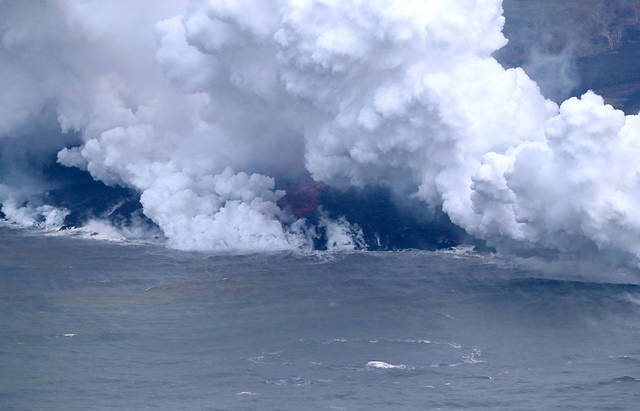
JAMM AQUINO / JAQUINO@STARADVERTISER.COM
Lava entered the ocean from the latest flow Monday near Pahoa.
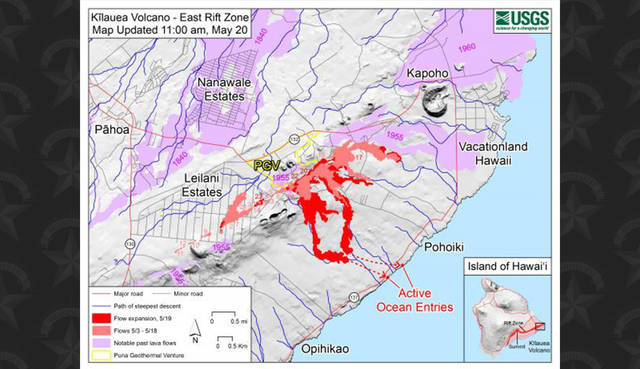
COURTESY USGS
This map shows the lava flow from Kilauea Volcano in the East Rift Zone as of 11 a.m. Sunday. The active ocean entry is shown by dots. Previous lava flows from eruptions in 1840, 1955, 1960 and 2014-2015 are shown in purple.
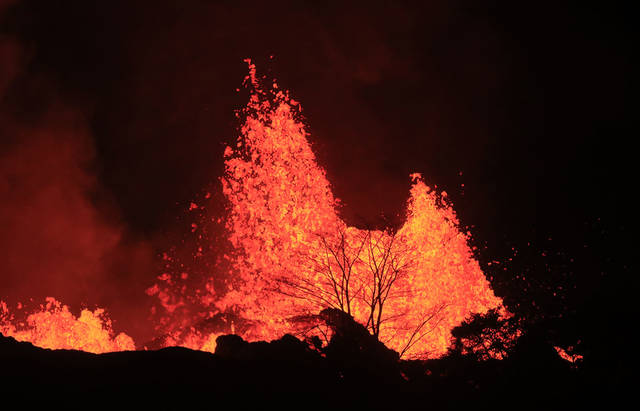
JAMM AQUINO / JAQUINO@STARADVERTISER.COM
Lava erupted Sunday inside Leilani Estates near fissure 17 in Pahoa on Hawaii island. Lava has finally reached the ocean, but experts advise exercising caution near plumes of “laze,” as they contain particles of glass as well as toxic sulphuric acid.

U.S. GEOLOGICAL SURVEY / CAROLYN PARCHETA
Lava flowed around a kipuka, an “island” surrounded by younger lava flows, before entering the ocean Monday morning in Kilauea Volcano’s Lower East Rift Zone on Hawaii island.
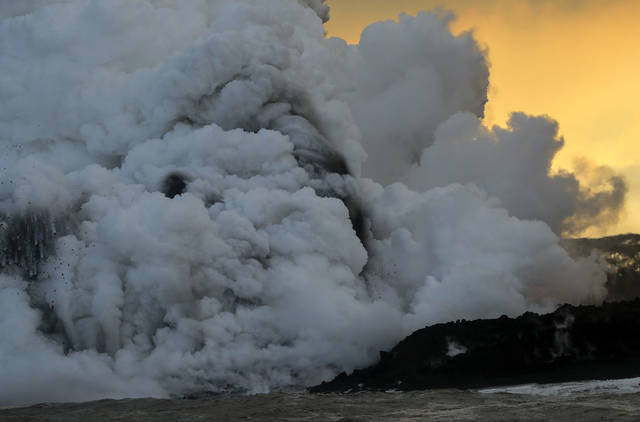
JAMM AQUINO / JAQUINO@STARADVERTISER.COM
Lava entered the ocean Monday in Lower Puna on Hawaii island. Experts advise exercising caution near plumes of “laze,” as they contain particles of glass as well as toxic hydrochloric acid.
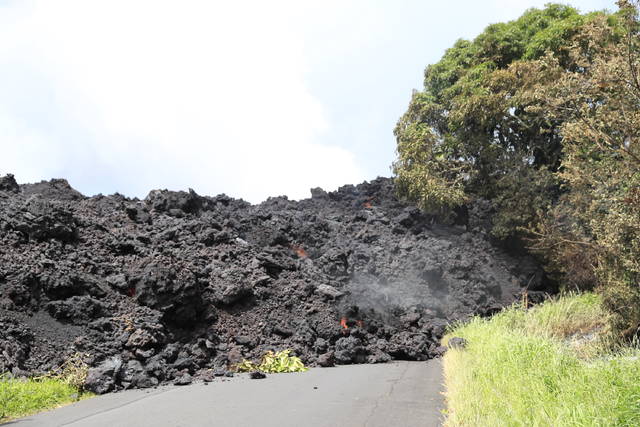
JAMM AQUINO / JAQUINO@STARADVERTISER.COM
A cooling lava flow that overran Highway 137 is seen Sunday in Pahoa. Lava has now reached the ocean, crossing Highway 137 late Saturday evening.







UPDATE: 10:06 a.m.
Light ashfall is likely to continue from Kilauea volcano, the National Weather Service said in a bulletin.
Ash fallout is likely to occur over the Kau district and Highway 11 southwest of the town of Volcano, including the communities of Pahala, Wood Valley and Naalehu, weather officials said.
However, trace amounts of ash deposited over the last few days are likely being picked up by locally gusty strong trade winds, contributing to dusty conditions.
>> Geothermal plant on Hawaii island declared ‘essentially safe’
>> Leilani Estates family ‘heartbroken’ as huge crack runs under their home
>> Kilauea ashfall continues as fissure activity, volcanic gas levels remain high
>> Crews struggle to ‘quench’ geothermal power plant wells as lava advances
>> Poverty, illness compound problems for Puna community
RELATED PHOTOS AND VIDEO
>> Live webcams from Hawaii island
Don't miss out on what's happening!
Stay in touch with breaking news, as it happens, conveniently in your email inbox. It's FREE!
>> Video: Big Island resident Lisa Hildwine talks about Kilauea’s impact
>> Video: Dept. of Defense aerial footage of Kilauea, May 22
>> Video: Lava erupts inside Leilani Estates, May 20
>> Photos: Lava approaches Puna Geothermal Venture, May 22
>> Photos: Pahoa community meeting, May 22
>> Photos: Lava flow in Lower Puna, May 21
>> Photos: Lava flow at Leilani Estates, May 20
COMPLETE KILAUEA COVERAGE
>> Star-Advertiser volcano coverage
>> Kilauea Volcano YouTube playlist
9:50 a.m.
Several fissures are still very active today, fountaining lava and spanning about a mile along the rift from Leilani Estates to Lanipuna, according to Hawaii County Civil Defense.
The Kilauea summit continues to spout ash, although plumes measure less than 8,000 feet high.
The National Weather Service forecasts trade winds to keep blowing today between 15 to 20 mph.
7 a.m.
County, state and federal partners are working together to monitor the situation at Puna Geothermal Venture, according to the Hawaii County Civil Defense.
State and county departments working with PGV continue to work to install mechanical plugs into the shafts of 10 geothermal wells to further secure them.
6:30 a.m.
The middle portion of the fissure system continues to produce the most robust eruptive activity in the Lower East Rift Zone, according to the Hawaiian Volcano Observatory.
Although a faint glow was seen from fissure 9, no flows or methane was observed burning in road cracks overnight. The ocean entry remains active, producing occasional small explosions. And the raised lava pond has reached 36 feet above ground level, according to observers.
Volcanic gas emissions remain “very high” from the fissure eruptions, the HVO said.
5 a.m.
The Leilani Estates subdivision continues to see ground cracking and the eruption of lava, with the potential for new lava outbreaks in the area, according to the Hawaiian Volcano Observatory.
The most active fissures Tuesday were 22, 19, 6, 5 and 23, HVO officials said in a status update. Meanwhile, activity at fissure 17, at the northeastern end of the fissure system, has eased up.
Magma continues to be supplied to the lower East Rift Zone, and fissure 6 is feeding a flow to the south, roughly parallel to the western flow from fissure 22.
Although there were only a few earthquakes Tuesday in the rift zone, overall earthquake activity remains elevated.
Volcanic gas emissions at the summit also remain high, and “additional explosive events that could produce minor amounts of ashfall downwind are possible at any time,” according to the HVO.
PREVIOUS COVERAGE
TUESDAY, MAY 22
5 p.m.
Lava activity continues at multiple sites with fissure 6 through 22 erupting lava fountains, the U.S. Geological Survey reported.
The fountains from fissure 22 feed a single lava channel that reaches the coast just north of MacKenzie State Park. The actual point of entry has been shifting to the west today.
Spattering continues from fissures 5, 6, and 19 that fed a lava flow to the south that is now stalled and a smaller flow to the north along and south of Pohoiki Road. Weak spattering continues at fissure 17.
Meanwhile, a new area of fountaining started this afternoon along the fissure line between Kaupili and Mohala Streets near fissure 23.
In addition, volcanic gas emissions have tripled, so sulfur dioxide concentrations are likely elevated to higher levels throughout the area downwind of the vents.
Ash masks will be distributed from Wednesday to Sunday in Pahala, Volcano, Na’alehu, Hawaiian Ocean View Community Center, and Keaau.
N95 masks protect you from breathing volcanic ash, but do not protect against gases and vapors. They will be distributed as follows:
Wednesday, Thursday and Friday, from 3:30 p.m. to 7:30 p.m.
>> Cooper Center, Volcano
>> Pahala Community Center, Pahala
>> Naalehu Community Center, Naalehu
>> Hawaiian Ocean View Community Center, HOVE
>> Shipman Gym, Keaau
Saturday, from 9 a.m. to 1 p.m. at all locations.
Free masks will be made available to all families including those who picked masks last week.
4:30 p.m.
Airbnb announced today that they are expanding its Disaster Response program Opens in a new tab to the rest of the Big Island in response to the increasing number of displaced residents.
The program was first activated last week.
Airbnb is encouraging hosts across the island to consider opening their door to provide free temporary accommodations to those in need.
Significant levels of toxic sulfur dioxide gas — as high as 15,000 tons a day — are being produced along the lower East Rift Zone as magma underground nears the surface, U.S. Geological Survey officials said today.
“Even from the summit eruption that occurred and Puu Oo, neither one of those ever produced such high numbers of sulfur dioxide,” said Wendy Spovall, spokeswoman for the USGS Hawaiian Volcano Observatory. “The higher emission rates correspond with the more voluminous lava flows.”
Previous levels of sulfur dioxide in the Puu Oo Crater measured about 200 to 300 tons a day. There are no sulfur dioxide emissions currently coming from the crater, she said. Kilauea’s summit averages 3,000 to 6,000 tons a day.
Meanwhile, an explosion occurred at the summit this morning, which sent an ash plume as high as 8,000 feet. Scientists also saw parts of the volcano’s southwest wall collapse.
Officials are warning the public about methane explosions near areas of vegetation. Methane explosions occur when gas is produced as lava burns vegetated areas.
“It can travel in pockets under the ground. Explosions can occur several feet away from where lava is flowing,” Spovall said. “These can be extremely violent and can throw blocks several yards in distance and can create a big crater.”
Officials are working to open Chain of Craters road as an evacuation route only for Kalapana residents, said Jessica Ferracane, spokeswoman for Hawaii Volcanoes National Park.
Hawaii County Civil Defense officials also said that on Monday night lava destroyed an old warehouse on the site of the former Hawaii Geothermal Project-A, which was an experimental state venture to explore the possibility of geothermal energy production. (The “A” in the project’s name refers to geothermal well A.) Earlier in the day, they had said the warehouse was on the Puna Geothermal Venture property, but later clarified that it was on the HGPA site, near Puna Geothermal.
A top executive in Hawaii for PGV said the concerns about lava inundation at the plant have been overblown.
Michael Kaleikini, senior director of Hawaii affairs for PGV, said the noise and emissions from more than 20 volcanic fissures and the enormous active lava flow on the Lower East Rift Zone dwarf any emissions or damage that could possibly result from an uncontrolled breach of the geothermal wells on the PGV site.
“From our perspective, there’s nothing that could occur at the PGV facility at the wells that would be any worse than what’s already occurring with the eruption,” Kaleikini said. The noise and geothermal emissions from any well breach would be far less than the roaring of escaping gas and lava from the ongoing eruption, he said.
“This is all about the eruption, and PGV is just a small component that happens to be in the area,” he said.
He noted the company has been working with state and county officials to “quench” three production wells at the site to reduce the risk of a release.
>> RELATED VIDEO: An enormous lava lake, threatening conditions at the Puna Geothermal Venture and high levels of sulfur dioxide and hydrogen sulfide billowing in the air prompted Hawaii County officials and the Hawaii National Guard to cancel all media tours into the areas affected by the lava from Kilauea Volcano that is advancing towards the geothermal power plant wells. (Video courtesy State of Hawaii, Dept. of Defense; mobile app users, click here Opens in a new tab)
Eight other wells on the site did not need to be quenched with cold water because they were not pressurized, he said. In other words, those wells were not generating upward pressure that could cause gases or fluids to escape.
Kaleikini said the nearest lava pad is within 100 feet of an area known as the “Boneyard,” where the company stores old parts and equipment. The lava has reached to within about 300 yards of the nearest well, he said.
Janet Snyder, spokeswoman for Hawaii island Mayor Harry Kim, said the U.S. Geological Survey has crews at PGV to monitor the movement of the flow near the 815-acre property.
She said the old warehouse that was destroyed at about 9:30 p.m. Monday was owned by the state, and was used in geothermal research projects early in the development of the prject.
That brings the total number of structures that have been destroyed to at least 47 since the eruption began on May 3, but civil defense officials say they believe the total is actually higher. They have been unable to say how many of the inundated structures were homes.
Fissure 22 has been directing most of its lava toward the ocean, but also released some lava in the opposite direction to the northwest toward the PGV plant. Snyder said fissures 6 and 19 also opened overnight and sent lava toward the PGV plant.
In all, Synder said the active fissures include 17, 20, 22, 19 and 6, “and possibly 5 and 8.” She said a flow from fissure 5 near the bottom of the Leilani Estates subdivision covered Kahukai Street at some point Monday night or this morning.
In other volcano developments today:
>> Hawaii County Mayor Harry Kim issued a supplementary emergency proclamation today suspending the June 30 real property tax deadline for parcel owners in Leilani Estates, Lanipuna Gardens, Pohoiki Bay Estates and Kapoho Estates whose property was adversely affected by the Kilauea eruption. The signed supplementary emergency proclamation can be viewed here Opens in a new tab.
>> reactivated Monday night and has been erupting since around midnight, according to Hawaii County Civil Defense. The flows from the fissure are slowly approaching Puna Geothermal Venture property. Residents and onlookers are asked to stay out of the area due to the hazardous conditions and are advised of the following road closures:
>> Weather officials advise that trace ashfall is possible southwest of Kilauea volcano after today’s 3:45 a.m explosive eruption. “Ash fallout will likely be mainly over the Kau district and Highway 11 southwest of the town of Volcano,” the National Weather Service said in an alert. Occasional small bursts of volcanic ash continue from Halemaumau crater.



